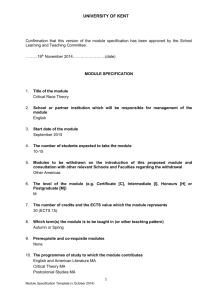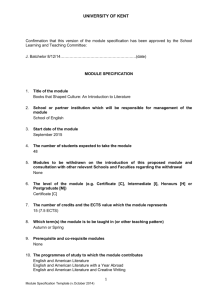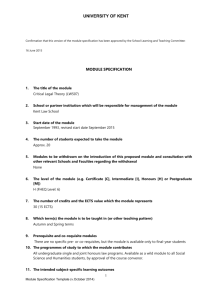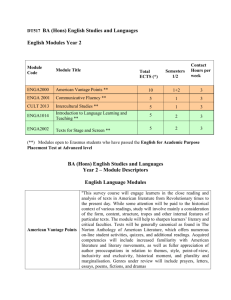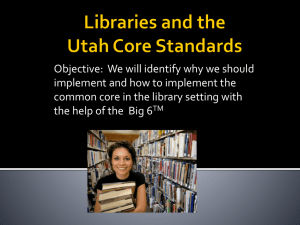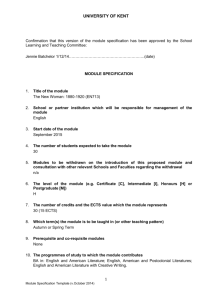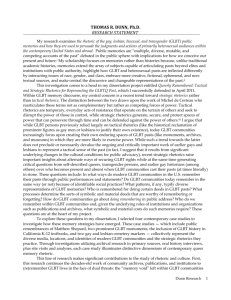University of Kent
advertisement
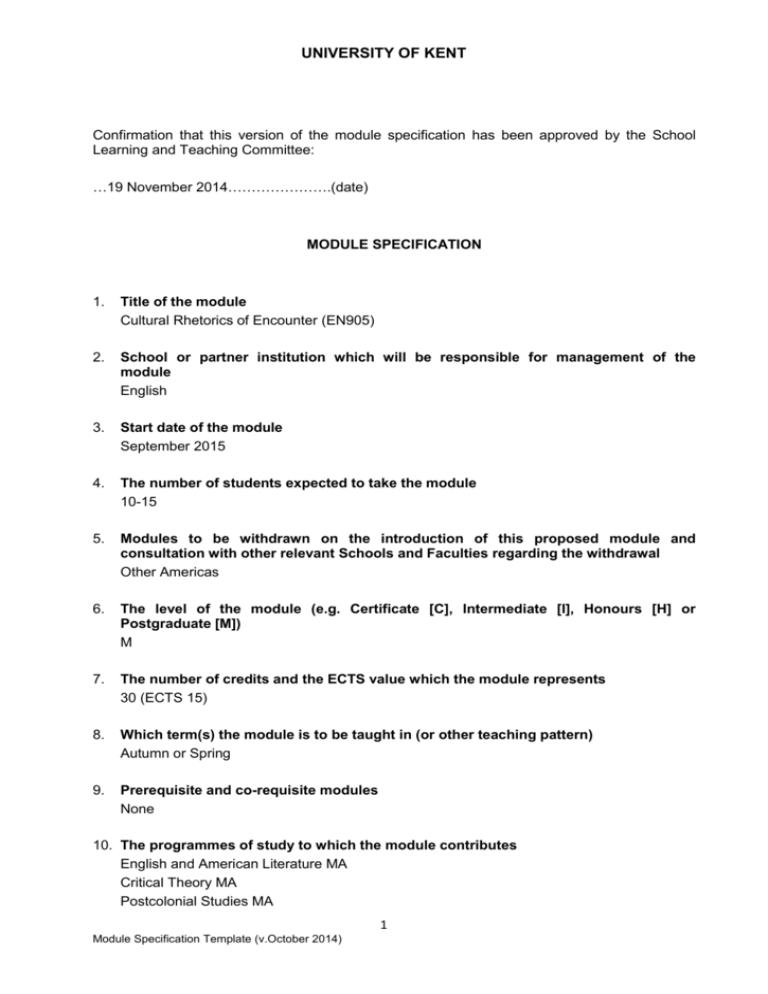
UNIVERSITY OF KENT Confirmation that this version of the module specification has been approved by the School Learning and Teaching Committee: …19 November 2014………………….(date) MODULE SPECIFICATION 1. Title of the module Cultural Rhetorics of Encounter (EN905) 2. School or partner institution which will be responsible for management of the module English 3. Start date of the module September 2015 4. The number of students expected to take the module 10-15 5. Modules to be withdrawn on the introduction of this proposed module and consultation with other relevant Schools and Faculties regarding the withdrawal Other Americas 6. The level of the module (e.g. Certificate [C], Intermediate [I], Honours [H] or Postgraduate [M]) M 7. The number of credits and the ECTS value which the module represents 30 (ECTS 15) 8. Which term(s) the module is to be taught in (or other teaching pattern) Autumn or Spring 9. Prerequisite and co-requisite modules None 10. The programmes of study to which the module contributes English and American Literature MA Critical Theory MA Postcolonial Studies MA 1 Module Specification Template (v.October 2014) UNIVERSITY OF KENT MA in the Contemporary American Studies MA 11. The intended subject specific learning outcomes On successfully completing the module students will be able to: 11.1 develop a systematic understanding of the emerging discourse of Cultural Rhetorics and awareness of how to critically apply its insights to a range of literary and material culture relevant to Britain’s colonial relationships with North America’s Indigenous peoples 11.2 demonstrate their knowledge of the particular theoretical, social and cultural mechanisms by which meaning is made and contested 11.3 develop their understanding of the historical emergence of ideas of encounter, race, indigeneity, modernity, and national and ethnic identity, in relation to a range of literary, dramatic, and material cultural objects 11.4 develop independent and original arguments both with, and in relation to, the theoretical tools supplied by Cultural Rhetorics 12. The intended generic learning outcomes On successfully completing the module students will be able to: 12.1 demonstrate their ability to apply new conceptual terms or frameworks to their study of literary and other cultural texts and to incorporate these in their own research 12.2 demonstrate awareness of the complexities of historical and theoretical contexts, ideas, and texts and develop critically insightful and original responses to said complexities 12.3 respond to and communicate complex problems clearly to specialist and nonspecialist audiences 12.4 devise, undertake, and complete individual research projects, including regular documentation and evaluation, demonstrating methodical working practices, initiative, and self-direction 13. A synopsis of the curriculum This module will introduce students to the developing discourse of Cultural Rhetorics with a focus on the ways in which Encounter and related notions of Indigeneity, nationhood, Empire, and migration, have been understood and meaningfully inscribed in and through a range of cultural “texts”. Students will be asked to consider the ways in which a variety of texts, from objects and the contexts of their collection and curation to written documents to plays and performance art, both represent and interrupt the structures of meaning-making between ‘here’ and ‘there’, ‘home’ and ‘colony’. Focusing on relationships between Britain, France, and the US and Canada, and on texts/objects produced in or otherwise appropriated by Britain and France, as well as texts/performances designed either in response to earlier such productions, or intended to be presented in the colonial ‘centres’ of London and Paris, this course will cover the period of the so-called Great Peace of Montreal (1701) to the present day. Students will be encouraged to interpret texts broadly to consider material and performance cultures as well as a range of written documents (and to take full account of questions of aesthetics, politics, culture, and intellectual traditions. In addition to conventional seminars, the course will devote up to half of the seminars to site visits including museum trips (the British Museum, the Pitt Rivers Museum in Oxford, and the Musee du Quai Branly in Paris), and, where appropriate and available, performances or exhibitions. Costs for these visits will be paid by the students. 2 Module Specification Template (v.October 2014) UNIVERSITY OF KENT Key questions among early practitioners of Cultural Rhetorics (see Malea Powell et al) will also structure our conversations, including: • How does meaning-making work in specific cultures and/or communities of practice? What situates those practices discursively? Historically? • How are communities imagined through encounter? What rhetorical practices sustain them? How do communities constitute themselves in relation to specific geographies or in relation to imagined spatialities? • What structures and/or forces have impacted the production of meaning in a particular culture or community of practice? • What are the rhetorical markers of specific cultural practices? How do those markers constellate with other rhetorical practices? • How do theoretical ideas like “contact zones,” and “encounter” itself rhetoricize cultural practices? 14. Indicative Reading List An Indicative selected reading list might include: de Lahontan, Louis-Armand de Lom d’Arce, selected Dialogues (1703) Erdrich, Heid, Curiosities (play, 2010) Maungwudaus, An Account of the Chippewa Indians, who have been travelling among the Whites, in the United States, England, Ireland, Scotland, France and Belgium (1848) Monkman, Kent, Robin’s Hood (film, 2007) Rogers, Robert, Ponteach: A Tragedy (1766) Williamson, Peter, French and Indian Cruelty (1757) 15. Learning and Teaching Methods, including the nature and number of contact hours and the total study hours which will be expected of students, and how these relate to achievement of the intended module learning outcomes This module will be team taught (alternative weeks by subject matter) by means of weekly 2 hour seminars for ten weeks. Total Contact Hours: 20 Independent Study Hours: 280 Total Study Hours: 300 16. Assessment methods and how these relate to testing achievement of the intended module learning outcomes The module will be assessed by a single research-based case study of at least two texts/objects in dialogue. The case studies will result in essays of 5,000 words or projects delivered in other media (film, web, lecture) to an equivalent length. The final project will account for 60% of the final grade and will test all of the specific learning outcomes in terms of historical and theoretical knowledge (11.1, 11.2, 11.3) and to generic outcomes (12.1, 12.2, 12.3, 12.4) in terms of ability to apply that knowledge to literary and other cultural contexts and to develop the ability to communicate clearly and effectively in written form. 30% of the grade will be related to a 400-500 word weekly log of 3 Module Specification Template (v.October 2014) UNIVERSITY OF KENT research development (specifically related to generic learning outcome 12.4), and the remaining 10% will be awarded for an 15-20 minute oral presentation of their research project (which relates to generic outcome 12.3 in particular). 17. Implications for learning resources, including staff, library, IT and space This module draws on existing resources. 18. The School recognises and has embedded the expectations of current disability equality legislation, and supports students with a declared disability or special educational need in its teaching. Within this module we will make reasonable adjustments wherever necessary, including additional or substitute materials, teaching modes or assessment methods for students who have declared and discussed their learning support needs. Arrangements for students with declared disabilities will be made on an individual basis, in consultation with the University’s disability/dyslexia support service, and specialist support will be provided where needed. 19. Campus(es) or Centre(s) where module will be delivered: Canterbury 4 Module Specification Template (v.October 2014)
